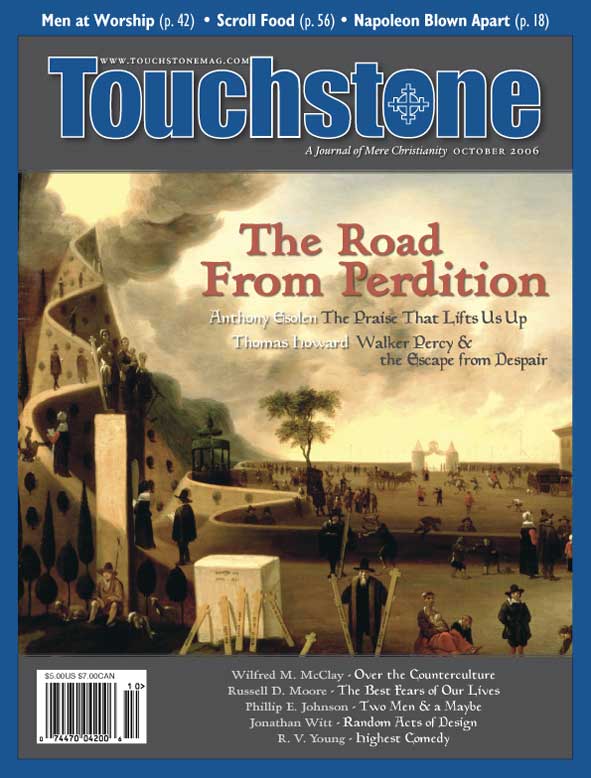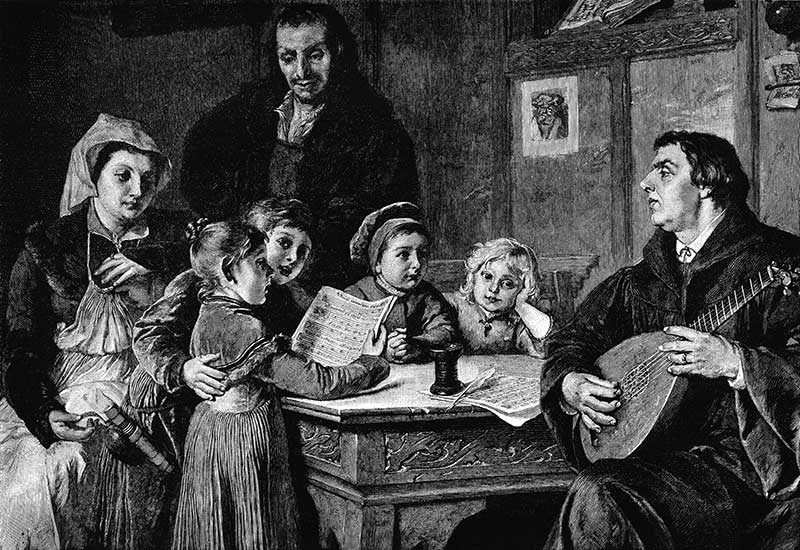Men at Worship
Why Men Hate Going To Church
by David Murrow
Nelson Books, 2005
(248 pages, $13.99, paperback)
reviewed by S. M. Hutchens
David Murrow, encouraged by Leon Podles’s The Church Impotent, supported by common sense and a collection of interesting statistics, lays out the evidence for the overwhelming domination of the Western churches not by men, as the feminist mythos has it, but by women. He describes the church as a place essentially for women, and the consequent uninterest and distaste of normal men for an institution they find not only irrelevant, but a threat to their masculinity. On assessing this pathology he does a fine job; I can’t think of anything he has missed.
Challenging Men
There are, however, some serious defects, particularly where Murrow—the director of Church for Men, which helps “churches unleash the masculine spirit throughout the organization”—attempts to deal with the origins of the problem and suggest therapies for it.
The liturgical service, for example, is merely a calcification of the morbid tendency, disliked by males, toward keeping people in their comfort zones by assuring them that things will always be the same. There is no recognition that it might, alternatively, represent an attempt to retain an orthodoxy (“right worship”) that is constantly under attack, which men have a duty to preserve, and for which they must in every generation fight.
Elsewhere he notes that men like challenges, but does not include among them that of sitting themselves down for more than eight minutes to listen to a sermon. Rather than having the men demand excellent preaching that is worth listening to for as long as the average television program lasts and exerting themselves to get enough knowledge to understand it, he recommends that the service be broken up with entertainments and supplemented by gimmickry of the sort normal men appreciate. Thus he reinforces every female prejudice about men being helpless and rather dull little boys who really need to be helped along in things religious by women.
Men like surprises, innovation, excellence, and challenges, but he does not seem able to conceptualize this except in terms of incorporating them in the programs of mega-type churches. There is little appreciation in this book for the involvement of men in the defense of the gospel—historically one of the principal concerns of manly Christian men, and not just of martyrs who die for the faith in other times and foreign parts.
The high cards are shuffled out here to religious innovators and those who wish to insure the involvement of men by giving them manly entertainments. One fails to see where this is an improvement on church feminization.
Following Women
Murrow effectively lays out almost every practical reason conceivable as to why the female pastorate is a terrible idea if the churches are to gain men. He makes it perfectly clear he understands that “few men will follow a woman unless they are forced. . . . Men follow female bosses, teachers, and commanding officers only because they can be fired, flunked, or court-martialed. But given a choice men rarely follow female leadership.”
He asks to be excused for not being a theologian on the issue, so for purposes of this review we will excuse him—but not for wimping out when he concedes that women pastors are the coming thing, and those women who are going to be pastors should think hard about ways to encourage men’s participation in church.
Despite his ceremonial reference to the famous Henrietta Mears—a kind of Evangelical Margaret Thatcher who got lots of things done—his observations and the logic flowing from them lead directly to the conclusion that women should, at least as a rule, stay out of the pastorate and the other prominent leadership positions in the church—and that their appearance therein will, at least generally speaking, do nothing but harm the cause he espouses in this book.
Ironic End
This all appears to me to end in an irony. The problems Murrow (accurately) identifies are so deep, so pervasive, and so destructive of the spiritual life of men, that they seem to call less for reform than elimination of “church” as many have come to think of it.
A womb-like building with Christ inside as the center of its worship is an essentially and naturally female environment, with female environmental elements, which may have, and indeed have had, the proclivity to serve as distractions from the worship of the Lord wherever the church does not take explicit and determined measures to exhibit him as he is.
There is a perennial temptation in the churches—and not only with the official advent of church-feminism—for undue exaltation of the glorifier because of its glory, and in this to lose sight of the Man who is the Object of glorification.
This reviewer sees the temptation to worship (I do not say give proper veneration to) the Lord’s blessed Mother as one with that to distract with decoration, liturgical display, or giving-over of worship to the subjective or emotive in which the warming of the heart, as it were, becomes the true and actual object of the gathering. It does not seem to me that the Evangelical or Pentecostal who listens to women preachers and whose services are based on the generation of spiritual excitement have any grounds upon which to criticize Catholic mariolatry or Baroque sanctuaries.
The Object of worship in the Christian Church is God the Father, in the Holy Spirit, through his consubstantial Son Christ Jesus, the Man who is God, One with the Father. The whole doctrine and discipline of the worshiping church is bent on maintaining this end. It is completely conducive to both male and female proprieties and elements, which are united in it, but only when they are properly conjoined with head and body parts rightly oriented and related to each other.
Nursery Church
What Mr. Murrow describes as the church that repels men is one in which they are forced to revisit a nursery where they are dominated and controlled by female authorities, where their adulthood, their intelligence, and their manhood, along with its privileges and responsibilities, are not recognized.
No grown man will voluntarily remain for very long in such a place, nor will he bring his family to where his manhood, a great gift of God manifest in his person, is constantly belittled before them. Nor will he last long in a church that fails to challenge him to listen to teaching worth hearing.
For what the man is seeking is not something to entertain him (he can get much better elsewhere), but something a man—a man who is grown and manly and whole—can die for. Any church that proposes to serve him with less will fail.
Church for Men can be found at www.churchformen.com.
S. M. Hutchens is a senior editor and longtime writer for Touchstone.
subscription options
Order
Print/Online Subscription

Get six issues (one year) of Touchstone PLUS full online access including pdf downloads for only $39.95. That's only $3.34 per month!
Order
Online Only
Subscription

Get a one-year full-access subscription to the Touchstone online archives for only $19.95. That's only $1.66 per month!
bulk subscriptions
Order Touchstone subscriptions in bulk and save $10 per sub! Each subscription includes 6 issues of Touchstone plus full online access to touchstonemag.com—including archives, videos, and pdf downloads of recent issues for only $29.95 each! Great for churches or study groups.
Transactions will be processed on a secure server.
more from the online archives
calling all readers
Please Donate
"There are magazines worth reading but few worth saving . . . Touchstone is just such a magazine."
—Alice von Hildebrand
"Here we do not concede one square millimeter of territory to falsehood, folly, contemporary sentimentality, or fashion. We speak the truth, and let God be our judge. . . . Touchstone is the one committedly Christian conservative journal."
—Anthony Esolen, Touchstone senior editor









